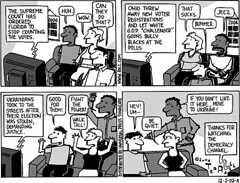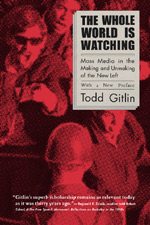Protest as Civic Engagement and the role of the media #2
Somehow I missed this comment in a Post editorial about Thailand, but eagle-eyed Post reader Manuel Briskin of Arlington caught it, and brings it to our attention via a letter to the editor in today's Post, "Voting With Their Feet":
The Sept. 21 editorial "Thailand's Leap Backward" said that political parties have been trying to force Thai Prime Minister Thaksin Shinawatra "from power through such undemocratic means as street demonstrations."
Haven't you heard of freedom of speech and freedom of assembly? And how did you feel about the street demonstrations that took place during Ukraine's Orange Revolution, elsewhere in the former Soviet bloc and in Tiananmen Square? Peaceful street demonstrations are not undemocratic.
But in this country they are too rarely covered. And too much effort is put into delegitimizing protest.

Ted Rall editorial cartoon, 12/2/2004.
The fact is, newspapers, being part of the growth machine and supporters of the general political economy and society, aren't so big on challenging the status quo.
In the earlier piece, I don't think I mentioned Todd Gitlin's book, The Whole World is Watching, which is another of the books that has had tremendous impact on the way I view the world, especially media.

In the early 1960s, Gitlin was president of Students for a Democratic Society, a foundational organization of the student movement of the 1960s. This book is an expansion of Gitlin's dissertation, which analyzes how the New York Times and CBS News covered SDS, and how this impacted external perceptions of the movement, as well as how the organization was impacted internally, because of press coverage.
Another book I haven't really read, but should, is Making Local News by Phyllis Kaniss. From the description:
Why do crimes and accidents earn more news coverage than development and policy issues affecting thousands of people? Filled with revealing interviews with both journalists and city officials, Making Local News is the first comprehensive look at how the economic motives of media owners, professional motives of journalists, and the strategies of media-wise politicians shape the news we see and hear, thereby influencing urban policy.
And the Express ran an AP article today, "Pirate Radio Stations Challenge Feds," on the pirate form of community radio. Do you know that there is a community radio station in Mount Pleasant that is derived from this broad movement?
Similarly to how the press focuses on big institutions, radio and the broadcasting industry was originally a much more democratic and community-involved media (other than the RCA and newspaper-owned stations of the time). Robert W. McChesney has written many books about this. From the Wikipedia entry on Professor McChesney:
McChesney sees the Communications Act of 1934 as essentially allowing monopolistic rights to broadcasters who had shown the greatest propensity for profit. Subsequent to this act were the provisions of the Fairness Doctrine, which had provisions for public interest broadcasting due to the scarcity of the broadcasting resource. These restrictions were later overturned in the 1980's under the banner of "deregulation."
Two other local "independent media" resources are:
-- Provisions Library
-- DC Independent Media Center.
Then there are incredible learning opportunities and the ability to broadcast via DCTV (Public Access Cable). Plus the ability to listen to a wider variety of perspectives on the Pacifica Radio Station WPFW-FM Radio. And just making stuff available on the DC Government Cable Television Channels 13 and 16, showing Council Hearings and like says something.
Maybe the "revolution will not be televised" but information is out there. Plus the Internet of course.
Labels: civic engagement, media



0 Comments:
Post a Comment
<< Home